Review for World on a Wire
Wow! I have watched much of Rainer Werner Fassbinder’s work including many of his films, and more recently the excellent TV mini-series, Berlin Alexanderplatz, one of three forays into television for a director who made over 40 feature films in a very short career, ending with his untimely death at 37 years old. The only other two television outings, made before Berlin Alexanderplatz, were ‘Eight Hours Don’t Make a Day’ in 1972 and the shorter ‘World on a Wire’ a year later. Until now, I had seen neither of these.
I wasn’t entirely sure what I expected from ‘World on a Wire’, a relatively low budget affair which was made in a matter of weeks by Fassbinder who was known for working fast. What I wasn’t expecting was something that is utterly fantastic on just about every level. It looks stunning, with amazing location shots and sets that put me in mind of Stanley Kubrick and Nic Roeg, with inventive camera moves that, pre-steadicam, showed an incredible level of creative invention. It’s a beautifully crafted ‘film’, made in a hurry by a director who didn’t like pre-planning too much, preferring to work ‘in the zone’, deciding how a shot might work when he got to the location and could feel the natural light, and assess what might be creatively possible. As a result, there are a number of shots that would give even the opening of Orson Welles’ ‘A Touch of Evil’ a run for its money which you could easily mistake as shots that had been meticulously planned for weeks. Whilst this level of technical demand could often cause tension on set, it also inspired a (sometimes grudging) respect for Fassbinder from everyone involved.
But the ‘film’ (I prefer this descriptor than ‘TV show’ as it feels very much like a feature) offers up a lot more than just technical and creative brilliance in its construction. ‘World on a Wire’is an incredibly prescient film, way ahead of ‘The Matrix’ and ‘Bladerunner’ in its portrayal of virtual reality and AI. Watching it today, much of its dystopian prophecies seem more likely than ever they did in 1973, a tribute to the director and his team in really getting a deep understanding of how far computing technology might go, particularly when its power rests in the hands of corporate giants.
The story centres around Simulacron 1, a highly advanced project designed to elevate conventional computer technology to a new level by creating a virtual reality, inhabited by computer generated people or ‘identity units’. Conceptually, the results of this government work are intended to make planning for a glorious future for manking simpler and more scientific. By understanding and testing this alternative reality, the computer can accurately predict future consumer demand on natural resources, like steel production for example.
Unfortunately, such incisive big-data would also prove invaluable to unscrupulous businesses (FaceBook anyone?). When the head of the project dies mysteriously, after becoming totally exhausted and cynical, realising that not all is as it should be, Dr Stiller (Klaus Löwitsch – Firefox, Cross of Iron) becomes his successor. As the new doctor begins to probe deeper, the line between the real and virtual worlds become increasingly blurred and his own existence comes into question.
In a style beloved of David Lynch, we see Stiller’s assumptions about ‘reality’ become increasingly fractured, following a series of surreal encounters, including a trip into an alternative reality where he is able to freely engage with characters who are little more than inventions of the computer. But which reality is the ‘real one’? Stiller knows only too well that his predecessor was likely eliminated because he had stumbled on information set to discredit Simulacron which can never be allowed to happen. Stiller then turns cyber-detective, determined to find out why people are effectively ‘disappearing’ and what level of corruption is driving these crimes.
‘World on a Wire’ also stars the brilliant Barbara Valentin (Body in the Web, Our Man in Jamaica) and Mascha Rabben (Salome, The Sensuous Three), topping up the cast of well-known, golden era film stars, something Fassbinder was keen to do to give the characters a strange ‘where have I seen them before’ feel, a bit like one might expect to feel like when playing a sophisticated video game today where the lead characters are generally composites of well-known celebrities.
Whilst loosely based on an American writer Daniel F. Galouye's novel, Simulacron-3, ‘World on a Wire’ is very much a Fassbinder film. There is still a whiff of Berlin kinkiness here with lots of Fassbinder’s classic preoccupations played out, like mirrors and reflections, nude sequences and a smouldering cold, impersonal sexuality reminiscent of JG Ballard’s classic era sci-fi. It is arguably a political film too, very much anti-corporation. In short, mesmerising viewing.
This splendid edition from Second Sight uses a restored version of the original, by the Fassbinder Foundation along with cinematographer Michael Ballhaus (Goodfellas, The Departed) in 2010, utilising the original film negatives wherever possible and delivering a version that, even if you have seen it before, may be better than anyone has yet seen on the box. It should be note that it is in its original 4:3 full-screen aspect ratio, as you would expect for a TV movie from the 70s. The mono German soundtrack works just fine, as do the English sub-titles.
This edition also comes packed with contextual features which throw light on to Fassbinder’s curious ways of working and which go some way to showing how such a brilliant piece of work evolved.
In ‘No Strings Attached’ there is an insightful interview with assistant director Renate Leiffer who seems to have enjoyed a love/hate relationship with his mentor.
‘Observing Fassbinder’ is a tribute to photographer Peter Gauhe who spent years taking stills on sets of Fassbinder projects, even appearing in several small roles along the way, including a brief role in ‘World on a Wire’.
Perhaps the most impressive feature is Fassbinder's "World on a Wire": Looking Ahead to Today” , an hour-long documentary about the making of the film / TV series, directed by Juliane Lorenz. It features a series of interviews with cinematographer Michael Ballhaus, who oversaw the restoration of World on a Wire, co-screenwriter Fritz Muller-Scherz, and actor Karl-Heinz Vosgerau. Well worth a watch, this really does give great insight into how the film was made as well as going part-way to unravelling the complex, creative director himself. In German, with optional English subtitles.
The limited-edition box set houses the discs in a rigid, card slipcase along with a 50 page perfect-bound booklet featuring new essays by Anton Bitel and Daniel Bird and archival writing by Daniel Oberhaus and Christian Braad Thomsen, upon which I am unable to comment as I haven’t seen it.
‘World on a Wire’ is the best TV production I have seen all year and quite possibly the finest film too, if we are allowed to stretch that definition to encompass it. For me, it’s certainly the best Blu-Ray release of the year. Highly recommended.
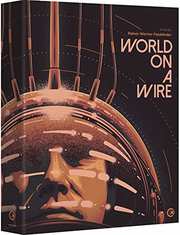
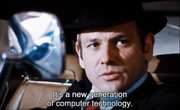
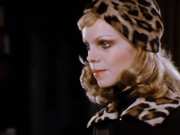
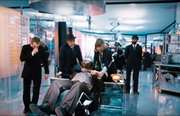

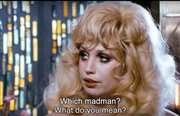
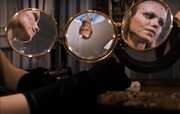
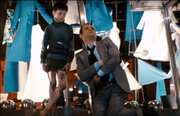

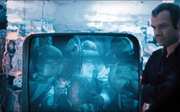









































Your Opinions and Comments
Be the first to post a comment!